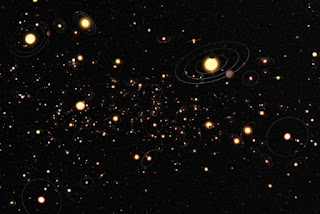 |
| NASA/ESA/ESO |
Topics: Astronomy, Astrophysics, Cosmology, Exoplanets, SETI, Theoretical Physics
A new tally proposes that roughly 700 quintillion (1018) terrestrial exoplanets are likely to exist across the observable universe—most vastly different from Earth
More than 400 years ago Renaissance scientist Nicolaus Copernicus reduced us to near nothingness by showing that our planet is not the center of the solar system. With every subsequent scientific revolution, most other privileged positions in the universe humans might have held dear have been further degraded, revealing the cold truth that our species is the smallest of specks on a speck of a planet, cosmologically speaking. A new calculation of exoplanets suggests that Earth is just one out of a likely 700 million trillion terrestrial planets in the entire observable universe. But the average age of these planets—well above Earth’s age—and their typical locations—in galaxies vastly unlike the Milky Way—just might turn the Copernican principle on its head.
Astronomer Erik Zackrisson from Uppsala University and his colleagues created a cosmic compendium of all the terrestrial exoplanets likely to exist throughout the observable universe, based on the rocky worlds astronomers have found so far. In a powerful computer simulation, they first created their own mini universe containing models of the earliest galaxies. Then they unleashed the laws of physics—as close as scientists understand them—that describe how galaxies grow, how stars evolve and how planets come to be. Finally, they fast-forwarded through 13.8 billion years of cosmic history. Their results, published to the preprint server arXiv (pdf) and submitted to The Astrophysical Journal, provide a tantalizing trove of probable exoplanet statistics that helps astronomers understand our place in the universe. “It's kind of mind-boggling that we're actually at a point where we can begin to do this,” says co-author Andrew Benson from the Carnegie Observatories in California. Until recently, he says, so few exoplanets were known that reasonable extrapolations to the rest of the universe were impossible. Still, his team’s findings are a preliminary guess at what the cosmos might hold. “It's certainly the case that there are a lot of uncertainties in a calculation like this. Our knowledge of all of these pieces is imperfect,” he adds.
Scientific American: Exoplanet Census Suggests Earth Is Special after All
Shannon Hall
Comments